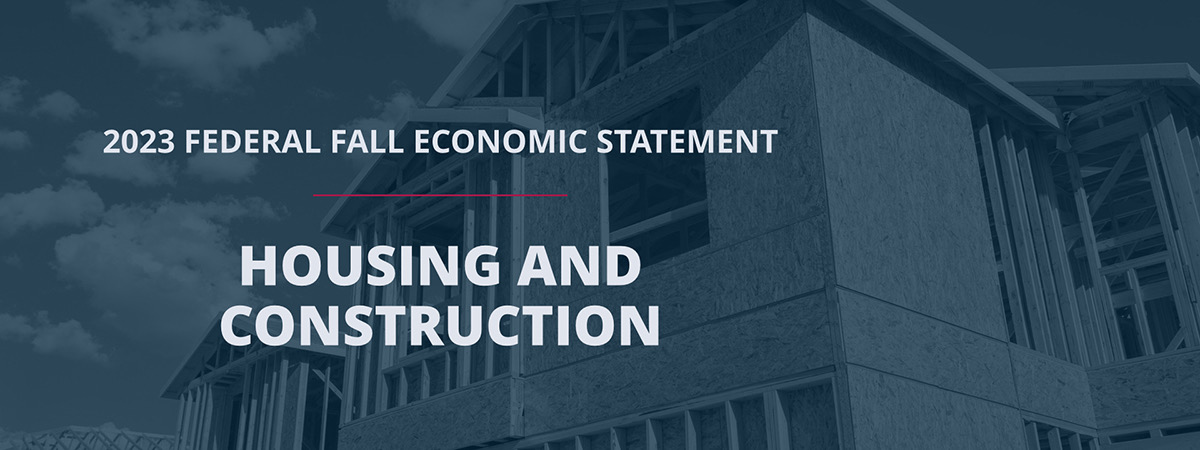On November 21, 2023, Canada’s Finance Minister unveiled the 2023 Federal Fall Economic Statement (“FES”). The FES expects inflation rates to decrease and subdued economic growth over 2024. The fiscal update contained several announcements on housing including investing billions into building new homes, increasing construction workers and targeting short-term rentals. The housing and construction mandates will be discussed further in this publication.
New Housing
The first key objective of the 2023 FES is to support the lower and middle class while housing prices are still high and with mortgage renewals pending. The second key objective for Finance is to encourage the building of more homes, faster, and to help make housing more affordable across the country. Finance is introducing new targeted measures which will aim to help stabilize prices and protect Canadians with mortgages. Additionally, the federal government is working with provinces, territories, and municipalities across Canada to break down local zoning barriers that aim to rapidly increase the housing supply.
Building More Affordable Housing
To build more affordable housing for Canadians, the FES announces an additional $1 billion over three years, starting in 2025-26, for the Affordable Housing Fund. This investment aims to support non-profit, co-op, and public housing providers to build more than 7,000 new homes by 2028. This amount is to be supported by $631 million that was previously intended for a one-time top-up to the Canada Housing Benefit. The federal government intends to announce reforms in early 2024 to make the Affordable Housing Fund and the Apartment Construction Loan programs more accessible with faster approvals.
Building More Homes, Faster
In March 2023, the government launched the $4 billion Housing Accelerator Fund which was implemented to help cut red tape and accelerate the creation of at least 100,000 new homes (which Finance expects to exceed). Agreements have already been announced with nine cities across Canada and the province of Quebec. The cities and agreements are listed in the FES Housing Accelerator Fund Agreements to Date section with further agreements to come. Some notable local cities are listed below:
| Brampton, Ontario | 3,150 homes |
| Hamilton, Ontario | 2,600 homes |
| Kitchener, Ontario | 1,200 homes |
| London, Ontario | 2,000 homes |
| Vaughan, Ontario | 1,700 homes |
In addition to the Housing Accelerator Fund, the federal government is also working to provide:
- Over $25 billion in low-cost financing to build more than 71,000 new rental homes in Canadian cities through the Rental Construction Financing Initiative;
- Over $13 billion through the National Housing Co-Investment Fund to build 60,000 new affordable homes and repair 240,000 homes;
- $4 billion through the Rapid Housing Initiative, which is building more than 12,000 affordable homes for people experiencing homelessness or in severe housing need;
- Over $200 million through the Federal Lands Initiative to build 4,500 new homes by repurposing surplus federal lands and buildings to housing providers at low or no cost. The FES announced six surplus federal properties that will be developed into new homes mainly in Ottawa, Calgary, Edmonton and St. John’s;
- Over $750 million through the Affordable Housing Innovation Fund to support innovative solutions for the next generation of housing in Canada; and,
- $6.7 billion for housing for First Nations on reserve, and Inuit, Métis, and First Nations Self-Governing and Modern Treaty communities.
More Financing for Apartment Construction
To increase the supply of rental housing in Canada, Finance believes builders need access to low-cost financing which allows them to build homes faster. The Apartment Construction Loan Program, previously known as the Rental Construction Financing Initiative, aims to increase construction of rental housing by providing low-cost financing to builders and developers. To support the building of more than 30,000 new homes, the FES announces an additional $15 billion in new loan funding, starting in 2025-26, for this program. This will bring the total loan funding to over $40 billion and the program’s total contribution to over 101,000 new homes supported by 2031-32 as projected by Finance.
Cracking down on short-term rentals
The federal government is cracking down on short-term rentals that are keeping homes off the market. Finance proposes to deny deductions for short term rentals in provinces or municipalities that have prohibited short-term rentals. This includes interest expenses, property taxes, etc. The government intends to deny income tax deductions when short-term rental operators are deemed non-compliant with the applicable governing bodies licensing, permitting, and registration requirements. This measure relates to all expenses incurred on or after January 1, 2024.
The FES also proposes $50 million over three years to support municipal enforcement of restrictions on short-term rentals starting in 2024-25. This will support municipalities with strict regulatory regimes in returning short-term rentals back to the long-term housing market. Some provinces, including Quebec and British Columbia, and municipalities such as Toronto, Montréal, and Vancouver, have already taken action through measures like Underused Housing Tax (UHT) or Vacant Home Tax.
To better understand the short-term rental landscape in Canada and inform future housing policy, the federal government will explore options to collect data on short-term rentals.
More Constructions Workers to Build More Homes
The FES announced the federal government is aiming to attract talent in the construction sector by continuing to remove barriers to international labour mobility. Furthermore, they will look to the provinces to reduce red tape that restricts the movement of workers especially in construction by expanding the Red Seal Program and eliminating duplicative credential recognition.
Resources
FES 2023 – Canada’s Housing Action Plan
The information in this article is of a general nature and is in summary form. Contact one of our tax professionals to discuss these matters in the context of your situation before acting upon such information.






